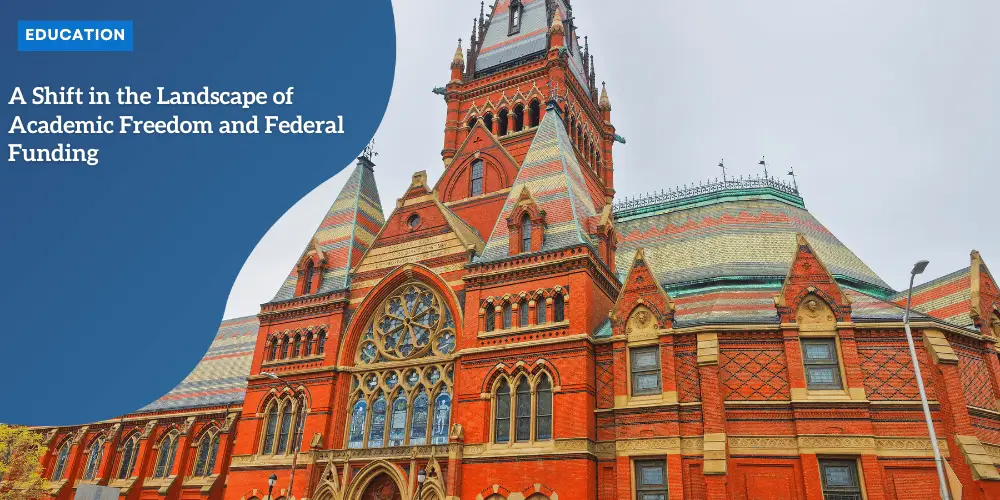A Shift in the Landscape of Academic Freedom and Federal Funding

Anúncios
Harvard University Faces Federal Funding Freeze as Trump Administration Increases Pressure on Higher Education Policies
In an unprecedented move, the Trump administration has made it clear that it intends to halt all new federal research grants for Harvard University unless the institution complies with a series of politically charged demands.
This action has set the stage for an escalating battle over political ideology, academic freedom, and government control over higher education institutions.
Harvard’s Research Funding Under Fire
The latest developments in this ongoing dispute come as the Trump administration seeks to impose significant changes on the operations of one of the nation’s most prestigious universities.
As part of a broader crackdown on higher education institutions, the administration has moved to cut off all new federal research funding to Harvard.
Anúncios
Education Secretary Linda McMahon outlined these new steps in a letter to Harvard’s president, Alan Garber, emphasizing that the university’s repeated violations of its legal responsibilities and ethical duties disqualified it from receiving federal funds.
In addition to the $2.2 billion in federal research grants and contracts that the White House froze last month, McMahon’s letter underscores that Harvard’s actions have led to this drastic decision.
According to McMahon, the university’s failure to adhere to its legal and ethical responsibilities and its disregard for transparency have undermined the integrity of the higher education system.
The Administration’s List of Grievances Against Harvard
Among the key issues raised by the Trump administration are Harvard’s stance on affirmative action, its handling of campus protests, and its temporary suspension of standardized testing requirements, such as the SAT and ACT.
The latter policy was reinstated in April 2024, but the Trump administration has criticized it as an example of Harvard’s failure to maintain academic rigor.
Anúncios
These actions, according to McMahon, represent a broader disregard for the legal, ethical, and fiduciary obligations that Harvard holds.
Harvard, on the other hand, has vehemently rejected these accusations, calling the administration’s demands “unprecedented” and warning that they would severely undermine the university’s autonomy and academic freedom.
The university has committed to continuing to comply with legal requirements and to fostering an environment that respects diversity of thought and combats discrimination.
It also made it clear that it would fight against any government overreach that could stifle academic research and innovation.
The Implications of a Federal Funding Freeze
The Trump administration’s letter indicates that if Harvard fails to address the administration’s concerns, all public funding to the university will cease.
This would not only affect federal research grants but could also extend to other areas of public funding, leading Harvard to rely on its significant private resources, including its $53 billion endowment and its large base of wealthy alumni.
The freeze on federal funding will primarily target research grants, which are estimated to represent over $1 billion annually in federal support.
However, the suspension of funding will not currently affect student financial aid programs, such as Pell Grants or student loans.
The administration has also indicated that it is willing to negotiate with Harvard, but only if the university agrees to meet specific benchmarks demonstrating compliance with federal law.

Tensions Escalate Over Federal Control in Higher Education
The letter sent to Harvard represents a broader shift in the Trump administration’s approach to higher education.
By targeting an institution as influential as Harvard, the administration is signaling its intent to exert greater control over how universities operate, particularly in terms of diversity, inclusion, and political ideology on campus.
The administration’s demands include eliminating diversity, equity, and inclusion programs, implementing merit-based hiring practices, and turning over records of foreign students’ disciplinary actions.
The move to impose stricter oversight on universities, including Harvard, also ties into broader political debates over academic freedom, government intervention in education, and the role of universities in shaping national discourse.
Critics of the administration’s approach argue that such actions threaten the autonomy of universities and could stifle academic innovation, particularly in research areas that benefit national security and public safety.
The Role of Harvard’s Alumni in the Dispute
As Harvard faces this unprecedented challenge, the university is drawing on the support of its billionaire alumni to help navigate the pressures from the Trump administration.
Notable Harvard alumni, such as hedge fund CEO Bill Ackman, have publicly criticized the university for not negotiating more proactively with the White House over the terms of continued funding.
Ackman has also called for the resignation of Penny Pritzker, the chair of the Harvard Corporation, accusing her of mishandling the university’s response to the government’s demands.
Pritzker, however, remains steadfast in her support for the university’s independence and its commitment to upholding academic freedom.
She has emphasized that Harvard will not bow to government pressure and will continue to defend its constitutional rights and the principles that have made it a leading institution in the world.
Math Classes and Tuition Fees: New Areas of Contention
In addition to the broader political issues at play, the Trump administration has also pointed to specific areas of concern within Harvard’s academic offerings, including its remedial math courses and its high tuition fees.
McMahon raised these issues in her letter, questioning whether the university’s standards had slipped in recent years and whether its high costs were justified by the quality of education it provides.
These points have become new flashpoints in the ongoing dispute, as Harvard is forced to defend its academic programs and the value of its degrees in the face of political and financial pressure.
Harvard has recently expanded its math offerings, introducing a new five-day course to help students who may have fallen behind in their studies due to the COVID-19 pandemic.
The course, Math MA5, is designed to support students in areas like algebra, reflecting the broader learning gaps that have emerged as a result of the pandemic.
However, McMahon has used the introduction of this course to further criticize the university’s academic standards, questioning whether the university has lowered its acceptance standards or compromised its academic rigor.
The Bigger Picture: What’s at Stake for U.S. Higher Education
The ongoing battle between the Trump administration and Harvard is just one example of the growing tension between the federal government and the nation’s universities.
Other institutions, such as Columbia University, Princeton, and Cornell, have also faced pressure from the White House, with federal funding being suspended and investigations launched into issues related to campus protests and antisemitism.
The Trump administration’s approach to higher education is likely to have far-reaching implications for the future of academic freedom and the role of government in shaping educational policies.
The case of Harvard, as one of the most influential universities in the world, could set a precedent for how other universities are treated in the future, particularly as the political landscape continues to shift.
Conclusion: The Future of Academic Freedom and Government Control
As the dispute between the Trump administration and Harvard University continues to unfold, it is clear that the outcome will have significant implications for the future of higher education in the United States.
The issue of government control over universities, particularly in the areas of political ideology and academic freedom, is likely to remain a contentious topic for years to come.
Harvard, as a leading institution, is not only fighting for its own autonomy but also for the broader principle of academic freedom that underpins the American higher education system.
In the end, the resolution of this dispute will set a crucial precedent for how the federal government engages with universities and how higher education institutions navigate the complex intersection of politics, funding, and academic independence.
Whether or not Harvard ultimately accepts the administration’s demands, the fight over academic freedom and federal funding is far from over, and it will continue to shape the future of higher education in the United States.






